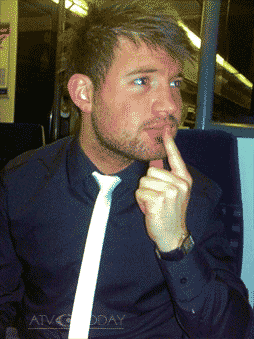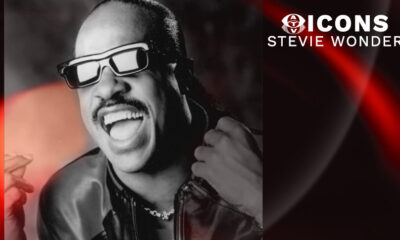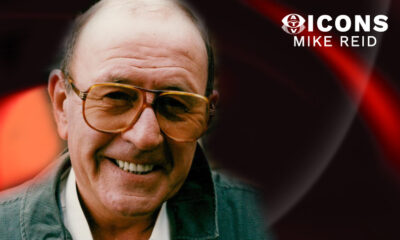Icons
ATV Icons: Lucille Ball
Exactly twenty years since her death Radio DJ Michael Keohan celebrates one of television’s enduring personalities, Lucille “Lucy” Ball – star of stage and screen for over fifty years.
Ball appeared in serious and comedy roles over her decades performing but is most fondly remembered for her CBS series, I Love Lucy.
To write an icons piece on Lucille Ball seemed quite a challenge. To cover all her eras would possibly need the space only a hardback book would offer. So pardon me for this being simply a thumbnail sketch of one of the biggest television icons of the 20th Century.
Born Lucille Désirée Ball on August 6th 1911 in Jamestown, New York she had a rough childhood living on ‘the wrong side of the street’. However, from an early age, Lucille had the ambition to become ‘a-somebody’ she also sought pleasure by entertaining others. She would attend drama school but later switched to modeling. The young Lucille was truly a very attractive figure.
Her brief modelling career took her into a showbiz direction when, in 1933, she was hired to become one of the Goldwyn Girls. In the same year came her film debut in Roman Scandals, she was contracted to RKO Pictures as a ‘supporting artist’ working her way up to eventually landing small speaking parts in many of their B pictures.
Ball appeared in so many of their movies she was given the tag of “Queen of the Bs”. Later she landed bigger supporting roles in movies such as the 1937 film Stage Door starring alongside Katharine Hepburn and Ginger Rogers.
She married Desi Arnaz in November 1940 having met the actor and bandleader on the set of Too Many Girls which they both starred in. Lucille’s early career was mainly concentrated in serious sagas, but with Desi, she would eventually break new comedy ground. Further movies followed in the 1940s including a successful spell at the MGM studios.
In 1948 she switched mediums to radio to star in radio comedy My Favourite Husband. Two years later television network CBS decided to turn the radio show into a visual series and Lucille was hired to continue in her role. She persuaded station executives to hire her real-life husband to co-star alongside her. She later, with Desi, bought the rights to the programme that had become a smash hit, it was of course I Love Lucy.
The half-hour show hit the air on October 15th 1951 and ran in its original form until 1957; later series saw the show run for an hour before finally ending transmissions forever on the 1st of April 1960. It is noted that I Love Lucy was the most-watched show in the United States in four of its six seasons and was the first series on US television to come to an end while still topping the ratings.
While their television relationship had bloomed, off-screen Lucille and Desi were drifting further apart and on March 2nd, 1960, the day after the last hour-long episode was filmed, Lucille Ball filed for divorce from Desi Arnaz. Although they would remain friends, mainly due to their two young children; Lucie Desree Arnaz and Desi Arnaz Jr.
Although her private life had its difficulties her professional career continued to rocket with first the launch of her own series The Lucy Show which ran for six years from 1961 to 1968. This was followed up with Here’s Lucy which also ran for a further six years.
In the 1970s Ball returned to the big screen in the film version of the musical, Mame. She co-starred in the movie alongside another CBS sitcom stalwart – Bea Arthur. Reviews for Mame were mixed, some critics loved it – while others loathed it. The harshness of some of the comments are believed to have been the reason Ball decided to never make another cinema movie.
Ball was nominated for an Emmy Award thirteen times, winning the award four times. She also was one of the first celebrities inducted into the American Television Hall of Fame as well as several Lifetime Achievement awards. The 1980s saw Ball appear more on talk shows and less in the way of regular series. In 1986 she would star in her final sitcom, Life With Lucy. The show, which aired on ABC, lasted only six episodes. It seems ‘times had changed’ and at that time a modern audience no longer wanted the slap-stick humour Ball had perfected.
It was also the 1980s that saw Lucille return to her more serious drama roots when she played a homeless elderly tramp in the made-for-television movie Stone Pillow.
As well as an on-screen personality Ball had also been a successful television executive. Alongside her first husband, Desi Arnaz, they bought the former RKO Film Studios and turned them into the home of Desilu Productions, a company they founded in 1950.
The studios under Lucille and Desilu brought some of America’s biggest shows to life from the studios. These include Mission: Impossible, The Untouchables, The Dick Van Dyke Show and the original television series of Star Trek. Its reported that Ball herself single-handedly kept Star Trek from being dumped from the NBC schedules after its first season. The studios also produced some successful movies in the 1960s including Yours, Mine, and Ours which starred Henry Fonda.
In 1962, Arnaz resigned as president and sold his holdings to Ball, who succeeded him as president. This made her the first woman to head a major studio and one of the most powerful women in Hollywood at the time.
On Tuesday, April 18th, 1989 Lucille was at her home in Beverly Hills when she started experiencing chest pains. Her second husband, entertainer Gary Morton, called an ambulance, and she was taken to the Cedars-Sinai hospital. Ball underwent bypass surgery. She received an aorta, from a 27-year-old male who had died in a motor accident. By all accounts, doctors and the press reported Lucille was making a good recovery.
However, on April 26th, 1989 Lucille Ball awoke with severe back pains. Her aorta had ruptured and Ball quickly lost consciousness. All attempts to revive her proved unsuccessful and at approximately 5:47am Ball died at the age of 77.
Despite its age, I Love Lucy is regularly repeated on Networks around the world. In the UK it aired on ITV for many years before switching to Channel 4 in the 1980s. Her successful movies and sitcoms have been released in more recent years on DVD, proving without a doubt 20 years after her death we still love Lucy.
 Michael Keohan is a radio presenter with Lite FM in the Cambs area.
Michael Keohan is a radio presenter with Lite FM in the Cambs area.
He also writes a monthly personal showbiz column for ATV Today.
ATV Icons celebrate the names past and present who have given a great deal to British Culture.





